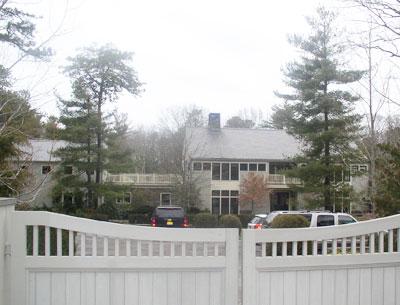Rehab Needs Review

The Dunes East Hampton, an exclusive drug treatment facility on Bull Run in Northwest Woods, will need to undergo a full site plan review before the East Hampton Town Planning Board if it is to stay in business in its current location.
On May 14, the town zoning board of appeals affirmed a July 10, 2011, determination by East Hampton’s chief building inspector, Tom Preiato, that the Dunes was functioning as a health clinic, which is classified under town code as a semi-public facility, allowed in a residential zone only by special permit.
The vote to uphold that determination was 4-1, with Don Cirillo as the board’s lone dissenter.
Alex Walter, the zoning board’s chairman, said Tuesday that in order to get the special permit, the Dunes East Hampton would have to simultaneously go to the planning board for site plan approval and a special permit and the zoning board for any needed variances.
The zoning board was guided through its May 14 deliberations on the Dunes by Joseph Prokop, who acted as a special counsel for the board on this one matter. Mr. Walter explained Tuesday that the town attorney’s office elected to bring in the special counsel because it wanted to avoid any suggestion of a conflict of interest.
Initially, in 2010, Mr. Preiato, being advised by Madeline Narvilas, then an assistant town attorney, ruled that the facility, located in a residential neighborhood, was permitted because the residents were acting as a family unit.
Ms. Narvilas subsequently left the town position, taking a job, instead, with the Dunes.
After Mr. Preiato reversed his original determination, made in early 2011, the Dunes ownership group, Safe Harbor Retreat, headed by Joe McKinsey, sued the town in January 2012, then withdrew the suit to allow the appeal process before the town’s zoning board to proceed. That process culminated with the board’s May 14 vote.
It is unclear whether Safe Harbor Retreat will reinitiate the suit or go before the planning board for site plan review.
Two calls this week to Joseph Campolo, of Campolo, Middleton, and McCormick, an attorney for Safe Harbor Retreat, went unanswered.
Before the zoning board members debated the issue on May 14, Mr. Prokop told them that they should consider all information in the record, acting as if they were the building inspector considering the issue for the first time.
Mr. Cirillo asserted that the residents of the Dunes should be considered a family unit under the federal Fair Housing Act, which would allow the facility to operate in a residential zone.
However, in response to a question from Mr. Walter as to whether federal regulations trump town code, Mr. Prokop answered, “It does not particularly trump East Hampton code, especially when it comes to health and safety. It has priority but it does not trump.”
Board members wrestled over just what is going on inside the gated 3.9-acre property.
“I still believe this is a hybrid of a clinic. It is a new business model that somebody thought up,” said Bryan Gosman, a board member.
“The organization applied for the same kind of business on Shelter Island. They applied, not as a residence, but as a business,” said David Lys, another board member, pointing out that after being turned down in Shelter Island, the company changed its tack for its East Hampton site, now calling it a residence.
“It has on its staff a clinical director,” Mr. Walter said. He spoke of the company’s Web site, which repeatedly refers to clinical services and uses variations on the word clinic many times.
“It appears to have the attributes of a clinic,” Mr. Walter said.
“It was a misunderstanding,” Lee White said of Mr. Preiato’s initial determination that said that residents at the Dunes were a family unit. “They are dispensing drugs,” Mr. White pointed out. “People can stay there for just a few days. This is operating as a semi-public facility.”
One of the problems the board had to wrestle with was the lack of clarity in the town’s code.
Mr. Preiato, when he addressed the board during its March 12 hearing on the matter, had spoken of the transient nature of people staying at the Dunes as playing into his determination that the Dunes was not a family unit.
But the word “transient” has no application, because it is not defined in the town’s code, a fact that was pointed out by Mr. Cirillo and confirmed by Mr. Prokop.
In other actions taken that night, Mr. Cirillo led the way in the board’s denial of an application from Carter Burwell, a prominent composer, to expand his Marine Boulevard house, which sits on a 27,663-square-foot oceanfront property.
Mr. Cirillo took particular exception to variances that are rarely asked for: a 14-foot, 8-inch height variance from the pyramid law, which is intended to prevent buildings from looming over neighboring properties, and a 353-foot total square footage variance for the amount of land the house will cover.
One of the reasons given by Mr. Burwell for the expansion was to build a sound studio for his work. “The applicant wants to work from home. But, over time, other rooms become bedrooms,” Mr. Cirillo said.
Other board members expressed deep misgivings over both of the variances requested.
“This is not a good application for us to approve,” Mr. Walter concluded, and the board voted 5-0 to deny Mr. Burwell’s request.
The board approved that night a minor expansion of Dick Cavett’s Tick Hall, a reconstructed McKim, Meade, and White house on the Montauk ocean bluffs, by a 4-0 vote. Mr. White was absent for the vote.
